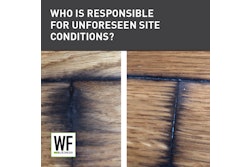

I recently got a call from a contractor in the eastern United States. A homeowner told the contractor that he was overcharging for his work, and the homeowner was not going to make the final payment. I asked the contractor why he thought the owner was making this claim. The owner had to get this idea from somewhere or someone, but the contractor told me he had no idea. He said the payment schedule and the total amount on the contract had never been an issue until he was hit with this bombshell.
What causes our customers to treat us this way? Where do they get the idea we are overcharging for our work? Even more important, why is it contractors are expected to honor their word and their contract, but homeowners seem to be able to make arbitrary changes to the contracts they sign or ignore them entirely? Why are they able to not make their payments on time or, sometimes, not at all?
Abolishing the "Industry Standard"
Part of the problem is the perception that contractors have an "industry standard" of 10 percent overhead and 10 percent profit. Few things are further from the truth. There are no industry standards on the price of our work, nor can there ever be.
So if you, the contractor, put language in your contract or an additional work order contrary to this perceived standard, some homeowners go ballistic. They take a contract with language different than those numbers to an attorney, and the attorney says, "They can't charge you that, that is not the industry standard." The fight is on.
Or, we hear of an owner's agent, an architect or designer refusing to release a draw or final payment on work completed if the contractor asks for an amount above some mythical industry standard the agent believes exists.
Why do they think they can enter into a contract and then unilaterally decide to change the terms? Part of it may be that contractors have the reputation of not being well-educated, and homeowners think they can bluff or bully their way into changing or rewriting the terms of the agreement. "Let's tell him we aren't going to pay the last payment and see what he does," they may think. They may have talked with a family member or neighbor who got a substantial reduction in the total price of a job by pulling that trick. Or, they have heard about another flooring contractor who gave freebies to his customer so he could get the money that was rightfully due him. The contractor had bills overdue and was willing to take less than what he/she was owed so they could pay those bills. The homeowners in these cases mistakenly believe that is how the game should be played.
Perhaps homeowners have heard most contractors are broke or nearly so and decide to push and see how much they can get for free before the contractor will fight back. "We'll tell him we aren't going to make the last payment, and if he doesn't like it he can sue us—I bet he doesn't have the money to pay an attorney" is another line of thought they may use.
Whatever the reason, without proper wording in your contracts, this can happen to you. Let's take a look at some things you can do to prevent this scenario from happening to you and your company. The solutions I offer are based on my own experience and that of a number of other contractors and attorneys. There are always exceptions and other ways to deal with these issues, but let's look at some options.
Clear Expectations
As you qualify your customers, you will hear questions and statements from the homeowner you must address. First, you must decide if they qualify to buy from you. This includes watching for telltale questions or remarks that alert you to arguments about money to come. One is potential customers telling you what they think the job should cost. A second, which is a huge red flag, is customers telling you what they are willing to pay for overhead and profit on the work you do. A third, more subtle sign, is your potential customer asking you what other companies charge for overhead and profit. If you hear comments and questions like these, I strongly suggest you reconsider working with these customers. (See the sidebar on this page for more warning signs of problem customers.)
You must take a position on what you are willing or not willing to do. Potential customers may tell you they want to furnish some of the materials, do some of the work on the job or even have a brother-in-law do the demolition or clean up work. Again, these are warning signs. You should be prepared to state your position clearly on these issues, and put that position in your contract.
Your contract should tell your customers what they are getting for the sales price you quote, what you expect from them, what they can expect from you and a detailed payment schedule. Cross your "T's" and dot your "I's." Also, include language that tells customers what you will do if they don't perform their portion of the agreement.
If an owner pulls a stunt on you like the one described above, is it worth fighting over? It all depends how good your contract is. If you write a good contract and it is clear, then by all means, force the issue and get your money. If you don't have a good contract, then get out as quickly and cheaply as you can. Then, spend some time learning how to put a good contract together.
From my more than 40 years in the construction industry, I can tell you the problems we are talking about happen far more often to contractors with oneor two-page contracts. Those who write good, in-depth contracts (lump sum contracts, I might add) have fewer problems with payments from owners than those trying to do cost-plus or time-andmaterial agreements. Cost-plus jobs are an absolute no-no in this business. Almost as bad are time-and-material contracts, unless they are for service work. (See the "Know Your Contracts" sidebar on this page.)
Vital Topics
There are several key components in a contract that can help you in the event you have problems with customes paying. First, have a binding arbitration clause, specifying a non-attorney as an arbitrator. The arbitration clause should also state that you or the homeowner could invoke the arbitration process within three calendar days of notification to the other party that you have a disagreement. Your best bet is an arbitrator who knows construction. The American Arbitration Association (AAA) does great work and can be a helpful resource; however, working with the AAA can be an expensive option. The cost of merely setting up the arbitration process with the AAA frequently is more than the cost of the entire arbitration process done by an arbitrator who knows construction but is not an attorney or an AAA member.
Second, have language in the contract that states if you retain an attorney or a collection agency to collect monies rightfully due, the homeowners will have to pay all collection and attorney's fees.
There are a litany of other subjects like hidden conditions, code violations, owners visiting job sites, owners talking to employees or subcontractors, charges for change work orders, animals and children in the work areas, fees and recovery, hazardous materials, missed appointments, right to file liens, down payments, progress payments and rescission notices. These are the issues that lead to the sort of misunderstandings that make homeowners decide they don't have to pay you. Cover these topics in your contract up front, before conflicts arise.
You may be the nicest person in the world and lay or refinish the best floors in the world, but if you don't put the language you need in your contracts, it is going to bite you sooner rather than later. Write a good contract, have your attorney check it and go into your jobs with the confidence that you will be paid—on time.
10 Warning Signs
Here are red flags that a customer may be a legal problem waiting to happen:
1) The customer tells you the job should cost $X,XXX.00.
They are trying to control your pricing before you even start. If you cave in, you'll have a never-ending battle on every payment and change throughout the job. If your customer says anything about the price of the work, look them right in the eye and say, "I will give you a firm price quotation for the work we will do, and we will honor that quote."
2) The customer wants to know your overhead and profit numbers.
Why? This is proprietary information that should be given out to no one. Plain and simple, it is not the customer's business.
3) The customer will pay only after the work has been completed.
Money changing hands means a commitment has been made. Why should you purchase all the materials and pay for all labor out of your pocket? You are not a lender. How many new homes can you buy without a down payment? Does your attorney require a retainer before taking a case? Get the down payment, or walk away.
4) The customer will only pay X % overhead and profit.
You alone must set your overhead and profit numbers. Give a lump sum quote for your work. Tell the customer your overhead and profit numbers are proprietary information and that you don't disclose them to anyone. No, you are not hiding anything. It is simply no one else's business what it costs your company to operate or what profit you wish to make. Would the customer be willing to post his salary in the local newspaper?
5) The customer wants to negotiate the price after you quote the job.
Tell the customer that the price you have quoted is a firm price quotation for the job as agreed. If the price were not fair, you would not be able to "compete" in the local market. Also tell the customer that if you leave today without the agreement signed and a deposit, the price will go up on any subsequent callbacks.
6) The customer shows you another company's contract and wants you to "beat it."
I would first ask the customer if they have paid the other company for the right to shop the quote around. If not, then it is not ethically right for you to review the quote. Be polite, smile and hand the quote back to them.
7) The customer talks about lien releases, escrow accounts, etc.
This is a warning sign that they have dealt with other contractors before, and it probably was not a good experience. Chances are they feel they were wronged in some way, and they are going to be sure it never happens again. Be fair and honest, but above all, be firm in what you are or are not willing to do.
8) The customer wants a cost-plus or time-and-material contract.
Time-and-material contracts are fine for very small jobs or service work, but not for any job that will be more than $1,500. Cost-plus contracts are to be avoided at all costs. Nine out of 10 arbitrations and two out of three lawsuits on construction-related issues are due to cost-plus or time-and-material contracts.
9) The customer wants retainage clauses and/or penalties in the contract.
Never enter into any contract with a retainage clause. They are not necessary and show a complete lack of trust on the part of the buyer. Why put yourself into this type of contract? Penalty clauses should be accompanied by bonus clauses. If they want a $50 penalty, you get a $100 bonus on the same issue.
10) The customer wants to furnish the materials.
The customer does this to try to save money. The materials they furnish will almost never be the same quality you would purchase for them, the order will be incomplete and in all probability won't be on the job at the required time. Then, no matter what goes wrong, guess who will be blamed for it?
Know Your Contracts
There are three basic types of contracts:
Fixed-figure or lump sum contracts (which include negotiated contracts) are the smartest choice because they detail what is to be done, by whom, when and what the final price will be.
Time-and-material contracts charge the customer a fixed rate for hours worked by the contractor and each employee on the job, as well as the cost of materials and expenses plus a percentage of the final bill. In general, they are fine for very small jobs or service work. Because of the lack of understanding about what a T&M contract should include, problems often arise about who is to do what and for how much.
Cost-plus contracts are based on the total cost of production (all accumulated costs), plus a fixed percentage or fixed amount. They have almost exactly the same problems as T&M contracts, but often generate problems faster.
































